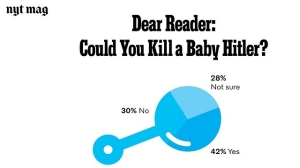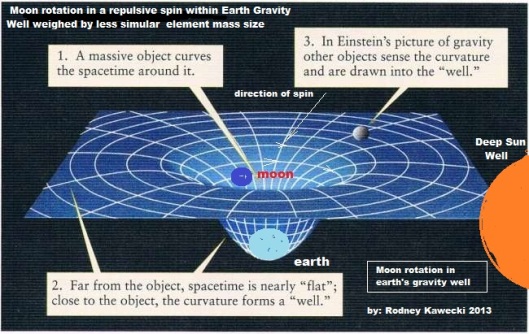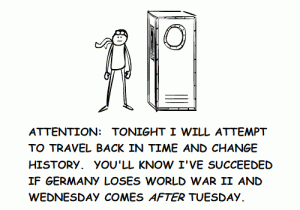If you could go back in time and kill baby Hitler, would you do it?
Chris over at The Story Reading Ape has a fabulously topical infographic on time travel that seems especially relevant after my review of the the kill-Hitler time travel story in Nicholas Rossis’ Honest Fibs.
Why is time travel important now? Surprisingly, given the other teeny little issues facing American voters—the economy, climate change, terrorism, and who has what plumbing where in public bathrooms— this has become an election year issue. When The New York Times Magazine posed it to readers a few months ago, replies leaned toward offing the little tyke.
 Responses among the Republican candidates’ were mixed. Jeb Bush—citing scientific evidence from that famous documentary, Back to the Future—said he’d kill Baby Hitler himself but there might be some unforeseen results. Ben Carson said he would oppose an abortion, even to save the life of the mother or in the case of incest or future death of six million Jews. He did, however, say he would be fine with going back in time to give guns to Jews. (Presumably so that well-armed little Jewish preschoolers could take out their future killer themselves. Neat!) Donald Trump, who hasn’t hesitated to propose walling off Mexico and refusing to allow Muslims into the USA, wasn’t ready to commit to Führer-infanticide.
Responses among the Republican candidates’ were mixed. Jeb Bush—citing scientific evidence from that famous documentary, Back to the Future—said he’d kill Baby Hitler himself but there might be some unforeseen results. Ben Carson said he would oppose an abortion, even to save the life of the mother or in the case of incest or future death of six million Jews. He did, however, say he would be fine with going back in time to give guns to Jews. (Presumably so that well-armed little Jewish preschoolers could take out their future killer themselves. Neat!) Donald Trump, who hasn’t hesitated to propose walling off Mexico and refusing to allow Muslims into the USA, wasn’t ready to commit to Führer-infanticide.
[NOTE: We’re not sure exactly how the Democrat candidates would respond to this. I’m imagining Hillary Clinton would go into all this boring physics and math stuff to explain how there is no such thing as time travel—she’ll have a powerpoint deck, but reporters will be looking at their twitter feed when the lights go down so nobody would be exactly sure what she was talking about. And Bernie Sanders might say that he would give Baby Hitler the benefit of the doubt, at least as long as he didn’t grow up to be a banker or middle-aged woman—in which case his supporters would, of course, have to kill him.]
So I thought I’d revisit an old post I wrote on the topic.
Any Time Travel = Hitler Won
When my daughter was in high school, any debate team reference to Hitler resulted in an automatic Godwin disqualification. Back in 1990, American author and writer Mike Godwin proposed what has come to be known as Godwin’s Law: “As an online discussion grows longer, the probability of a comparison involving Nazis or Hitler approaches 1.” In other words, the longer a discussion continues, the greater likelihood that someone will invoke the specter of Hitler and/or World War II.
For those who write time travel or speculative fiction, the corollary has come to be known as Godwin’s Law of Time Travel.
The first rule of time travel is that any and all modifications made to the timeline result in Hitler winning World War II. Run over a hippy in 1968? Hitler wins.
— colonel_green, ScansDaily

So, if your time traveller steps on a butterfly? Prevents a monkey’s death in the stone age? Buys the wrong baguette during the French Revolution? Even attempts to kill baby Adolf? It’s swastikas in the White House for sure.
Of course, there are other approaches. One theory says that time travelers actually can’t affect history. For example, let’s say you have an inventor so horrified by the millions killed during the Holocaust and WWII that he or she devotes their life to inventing a time machine. S/he goes back to kill Hitler, but is unsuccessful (this is, after all, a man who survived fifty-plus assassination attempts). Or perhaps our inventor somehow kills Hitler before his rise to power, the Holocaust never happens, and thus s/he would have no reason to invent the time machine in the first place. But if the time machine doesn’t lead to Hitler’s death, then the Holocaust does happen and the inventor creates the time machine and then…
Your head just hurts.
Other theories say that Adolf Hitler is just one man, himself barely in control of the sweep of history, and that events would have happened along the same lines no matter who rose to control in Germany. Or perhaps the results would have been even worse from our historical 20-20 hindsight— Stalin conquers Germany and keeps going, Mussolini becomes more powerful, Franco remains in power for forty years. (Oh, wait…)
Then there is the issue of how much science do you want in your science fiction? Approaches can vary:
1. Supersoft: “Apply Phlebotinum here.”

Phlebotinum is the versatile substance that may be rubbed on almost anything to cause an effect needed by a plot.
In essence, it is the stuff that makes the plot go. Without it, the story would grind to an abrupt halt. It’s science, it’s magic, it’s strange things unknown to science or magic. The reader does not know how Phlebotinum would work and the creators hope nobody cares.
According to Joss Whedon, during the DVD commentary for the pilot episode of Buffy the Vampire Slayer, the term “phlebotinum” originates from Buffy writer (and Angel co-creator) David Greenwalt’s sudden outburst: “Don’t touch the phlebotinum!” apropos of nothing.
[image credit: Flavorwire]

DeLorean Time Machine [Wikipedia: author–Terabass]
3. Hard: “Let me tell you about my theory, which integrates every piece of quantum physics from Einstein to Hawking.”
![All you need is a wormhole, the Large Hadron Collider or a rocket that goes really, really fast Stephen Hawking: How to Build a Time Machine [photo credit: Daily Mail, Large Haldron Collector]](https://barbtaub.com/wp-content/uploads/2015/07/article-1269288-05bc11000000044d-328_634x364.jpg?w=300&h=172)
All you need is a wormhole, the Large Hadron Collider or a rocket that goes really, really fast.
–Stephen Hawking: How to Build a Time Machine
[photo credit: Daily Mail, Large Haldron Collector]
4. Super Hard: “There is no such thing as time travel.”

Why Time Travel Is Not Possible. Ever. [image credit: Kawecki Universe]
Still confused? Sounds like you need an infographic. Luckily, Chris The Story Reading Ape has just what you need here.



Time travel makes my brain hurt. I have one idea for a sci fi novel, so you raise some great questions! The more science included, the more research into plausibility…
You are so great about linking the image to the artist. The Ape Man, not so much. Knowing how much work goes into those graphics, it always bugs me when people “borrow.”
LikeLiked by 1 person
Oooh! A time travel book? I hope you go for it.
LikeLike
It’s a SciFi without time travel, but way down the road.
LikeLike
Thanks for the link Barb 👍😃
LikeLiked by 1 person
Thanks for the fabulous infographic!
LikeLiked by 1 person
😃
LikeLike
Ohhhh, time travel – we could discuss this ad infinitum.
LikeLiked by 1 person
Yup!
LikeLiked by 1 person
I just know that if I “took out” baby Hitler (killing a baby? Maybe I could just make him deaf and mute so that he can’t persuade people to follow him?) that I would end up making things worse somehow. Then people would hate me and would go back in time to kill me. And I’d end up with followers who had no idea what my real intentions were and they’d do awful things in my name, convincing other time travelers to come back and kill me. And then an even worse dictator than Hitler would take over and I’d really have to come back and down him in his little infant bathtub. And then I’d be upset about killing a baby and others would hate me and go back in time to kill me…
Oh my…my head hurts…
LikeLiked by 1 person
It’s like Donald Trump running for president. Even if someone takes him down, the river of anger that’s floating his boat is still going to be there for someone else to navigate.
LikeLike
I’m not altogether sure we need to go back in time to get rid of Hitler. He seems to have been reincarnated as Donald Trump, but this time the silly hair is on the head instead of on the lip.
LikeLiked by 1 person
Amen, sister! (That’s what I said to Linda above, but darn… wish I’d put in the hair bit. It is the Donald-gift that keeps on giving.)
LikeLike
First, time travel is not possible – if it were we would be surrounded by wealthy tourists from the future, laughing until they wet themselves at our clothes, gadgets, daily work, and dozens would be trying to meet their ancestors for a variety of reasons.
Second, there is no such thing as
time,' only objects in motion, plus living things slowly ageing and dying etc so there's no fixed point where all the objects can be re-assembled and all the living things arranged in EXACTLY the right order. Because objects are constantly in motion, (see Newton, Einstein, Hawking et al) and living beings are continually changing in a million subtle ways, it is impossible for anything to reach that mythicalfixed’ point once again. Dates and times are a man-made invention, like money, love or religion. The only thing that truly exists is constantly changing matter, which is always travelling from here, to somewhere else.Therefore, there is no fixed point to reach, it is like trying to land a fishing fly in exactly the same body of flowing water in a raging river. The moment has gone, forever.
Even if it were possible to reconstruct the past and travel back to Hitler’s early years, killing him would probably not stop the rise of Fascism in Europe, given what we know of history. A figure akin to Hitler – and there were many – could well have convinced the German people, or enough of them, that an armed struggle for expansionism, matched to an ideology of racial superiority and a long-held grudge against the victorious powers in WW1, was the basis for a political movement that would transform a bankrupt Germany in the late 1920s and revitalise a humiliated nation.
In short, killing one man, does not kill an ideology of hate. Look at ISIS today – is it an idea, or an individual, that powers the struggle to establish a medieval Caliphate across a large part of the globe?
LikeLiked by 1 person
Of course you are right! That’s my whole point. If we try to say that history pivots around one person without taking into account the context, then we miss the point and have to repeat the mistakes of the past.
As I said above, even if Donald Trump is defeated in this presidential run, the anger that he’s tapped into is a deeper and (I believe) far broader current than the existing power elite on either side is prepared for.
LikeLiked by 1 person
Time travel makes a great plot theme, but I can never really go along with it 100%.. I’m a miseryarse sometimes ! 😎👍🏼
LikeLiked by 1 person
“miseryarse” I love it!
LikeLiked by 1 person
Love ‘Godwin’s Law’!!! 🙂
LikeLiked by 1 person
Hitler. The gift that keeps on giving…
LikeLike
Haha! Excellent post Barb! It makes my head hurt, but then that’s not difficult, I am easily confused! 😁 But would I kill baby Hitler? I’d like to think I would for the good of everyone, but the truth is, I just know I couldn’t kill anything. .. except a fly or a spider. And even then, maybe not spiders. Depends how big. Killing a baby anything is impossible.
LikeLike
Amusing piece, Barb. Not even near being like Stephen Hawkings, some of that was as clear as mud to me. 🙂 — Suzanne
LikeLike
Pingback: Why I DON’T want you to read TIMELESS by @CrystalCollier1 #BookReview #YAFantasy #timetravel | Barb Taub